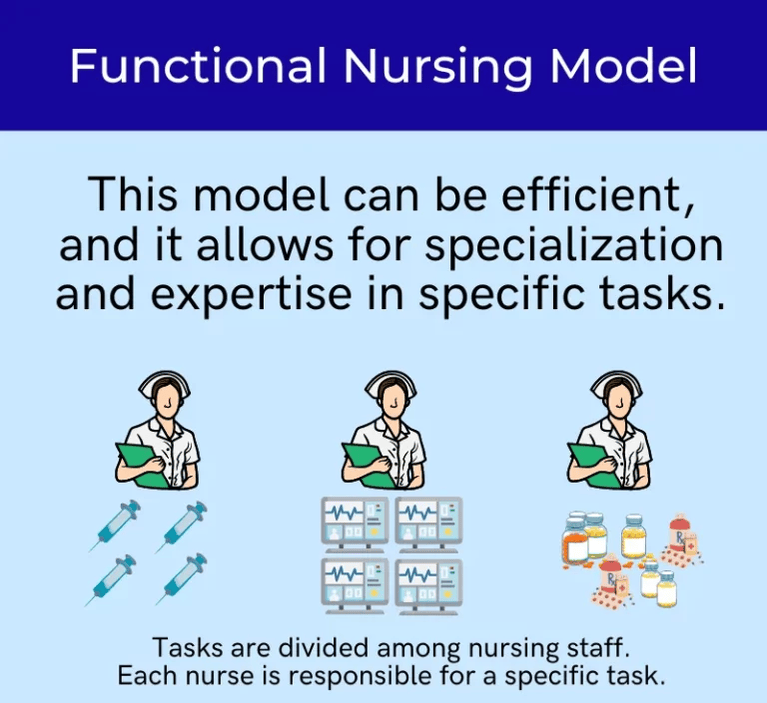Functional Nurse Specialist
A Functional Nurse Specialist (FNS) is an advanced-practice registered nurse with specialized clinical training in specific areas within healthcare settings.

In the field of nursing, it is important to know what sets each job apart from others. Clinical Nurse Specialists (CNS) and Nurse Practitioners (NP), their roles, education requirements, and potential career paths available to them. We will also answer some typical questions about the nursing hierarchy that might help you make informed decisions regarding your future professional development.
What are the main roles of a Clinical Nurse Specialist compared to a Nurse Practitioner?
The main role of a Clinical Nurse specialist is to focus on improving healthcare systems and outcomes through expertise in a specific area. Nurse practitioners provide direct patient care, diagnosing and managing acute and chronic conditions. Both roles are advanced, but CNSs emphasize system-level improvements, while NPs emphasize patient-level care.
The CNSs primarily practice in healthcare systems to enhance quality. They implement their specialized knowledge of clinical practices to develop new policies and implement them, teach others, and enhance the delivery of healthcare services. CNSs conduct research and promote evidence-based practices.
In contrast, NPs focus on direct patient care. They can assess and diagnose medical conditions, initiate treatment plans, and prescribe medications. Although both are considered crucial for advanced nursing practice, CNSs are key to system improvements, while NPs are key to patient-centered care.
How do the education requirements differ between Clinical Nurse Specialists (CNSs) and Nurse Practitioners(NPs)?
Both CNSs and NPs require a Master’s or Doctorate in Nursing, but NPs often specialize in family, pediatric, or geriatric care. CNSs typically focus on a particular clinical specialty, such as oncology or critical care. Each path involves specialized training for different healthcare settings.
The educational journey to becoming both a Clinical Nurse Specialist and a Nurse Practitioner starts with obtaining a Bachelor of Science in Nursing and achieving the status of a registered nurse upon passing the NCLEX-RN examination. From there, both CNSs and NPs complete a graduate degree, typically an MSN or DNP.
Where they really begin to differ is in terms of specialization. While NPs are likely to have a specialty with a particular population, such as pediatrics or geriatrics, a CNS is more likely to have a specific clinical specialty, like mental health or critical care. This specialized education prepares them for roles in healthcare that differ accordingly.

What is the scope of practice for Clinical Nurse Specialists vs. Nurse Practitioners?
Nurse Practitioners have a broad scope, including diagnosing and treating illnesses, prescribing medications, and performing procedures. Clinical Nurse Specialists primarily consult on and improve clinical practices and patient care quality within healthcare systems. CNSs may have a more limited direct patient care role.
Their scope of practice is very broad, and they may work as either a primary or specialty care provider. They are able to evaluate, diagnose, and treat patient care independently. They are licensed to prescribe medications as well as perform procedures such as suturing and biopsies.
The nurse practitioner has a role that has often been referred to as the physician, especially in the areas of primary care. In contrast, CNSs are advanced-practice nurses who specialize in improving health care delivery. They interpret data to improve patient outcomes, lead quality improvement projects, and offer expert consultation to healthcare teams—although they spend less time directly with patients.
Which career has more patient interaction: Clinical Nurse Specialist or Nurse Practitioner?
Nurse Practitioners typically have more direct patient interaction, managing care plans, and providing treatments. Clinical Nurse Specialists often work behind the scenes, influencing care through system improvements and staff education, although they still interact with patients to some extent.
NPs are also likely to be the first contact a patient has with the healthcare system and, as such, spend much of their time directly interacting with patients and families. They perform physical examinations, order and interpret diagnostic tests, and create treatment plans in concert with patients.
CNSs, on the other hand, tend to work on the systemic level of healthcare. Although they do have some contact with patients—especially when one is assessing clinical practices or introducing new interventions—their prime role is influencing patient care indirectly through training and policy development.

What is the difference in certification for Clinical Nurse Specialists and Nurse Practitioners?
Both roles require national certification, but NPs are certified in specific patient populations (e.g., adult, family, pediatric), while CNSs are certified in clinical specialties (e.g., oncology, cardiology). Certification reflects the practitioner’s specialized knowledge and clinical focus area.
The Nurse Practitioners and the Clinical Nurse Specialists require certification to practice their roles, which indicates higher skills and competence. In most cases, NPs are certified through boards such as the American Nurses Credentialing Center or the American Association of Nurse Practitioners in family health, adult-gerontology, or women’s health. CNSs are certified in a clinical specialty by organizations like ANCC, having specialties such as psychiatric-mental health, acute/critical care, or pediatric care. These certifications identify that a practitioner has expertise in their chosen area, so it is very important to guarantee quality and specialized care for patients.
Do Clinical Nurse Specialists or Nurse Practitioners have higher salaries?
Salaries can vary based on location, experience, and specialty. Generally, Nurse Practitioners tend to earn slightly higher salaries due to their direct patient care role and ability to bill independently for services. However, Clinical Nurse Specialists in specialized fields may also command high salaries.
While both CNSs and NPs have strong salaries as members of the nursing profession, in general, NPs do enjoy a slight advantage in earning potential. The reason usually given is that they work directly with patients, and so they are able to bill independently for services provided in most healthcare settings.
In general, it would be fair to say that they command a higher rate because they are able to bill and have a more extensive scope of practice. However, CNSs who have developed skill in high-demand specialties, such as oncology or cardiology, also can demand high salaries, particularly when they assume major leadership roles in health care systems.
Conclusion
In short, both clinical nurse specialists (CNS) and nurse practitioners (NP) are important in healthcare but have different roles they play as well as different career paths they follow. The choice between these two options depends on personal aims, interests, and the desired atmosphere at the workplace. Do a thorough investigation; weigh all pros and cons before making any decision about what kind of nursing profession suits best.
Functional Nurse Specialist
A Functional Nurse Specialist (FNS) is an advanced-practice registered nurse with specialized clinical training in specific areas within healthcare settings.

Tired of treating the symptoms but never really curing the disease? There is no doubt that conventional medicine has a significant role to play in healthcare systems. However, what if we had an alternative method that went deeper than this, one that is more interested in personalized measures and long-term wellness? Welcome to functional nursing.
How does a functional nurse differ from a traditional nurse?
Functional nurses are those who provide care to the whole person addressing the core, driving factors of symptoms and disease, and promoting wellness by making lifestyle changes. They work with their patients to develop an individualized health plan, whereas a traditional nurse would be working from set programs for symptom management and acute care.
Functional nurses address how body systems are interrelated and deal with wellness for the long haul, not just the quick fix. They will often work within interdisciplinary teams that include nutrition, stress management, and exercise while developing care plans. Traditional nurses usually follow standard medical mandates, typically focusing on acute symptoms and supporting various medical procedures.
What skills are essential for a functional nurse?
Functional nurses need strong assessment skills, a deep understanding of integrative medicine, and the ability to develop personalized care plans. They must effectively communicate with patients to promote lifestyle changes and use critical thinking to identify the root causes of health issues.
This also includes the art of good communication to educate and motivate the patient. Secondly, deep knowledge of integrative medicine like natural therapies and nutrition is required of the functional nurses so that a wide array of health choices can be made. Critical thinking helps them understand health complications, while empathy and patience are needed in giving the necessary amount of trust required to guide the patients on their paths to health.

How do functional nurses approach patient care?
Functional nurses emphasize a patient-centered approach, focusing on comprehensive assessments and personalized treatment plans. They address lifestyle factors like nutrition, stress, and exercise, collaborating with patients to achieve long-term health improvements beyond symptom management.
Functional nurses begin by evaluating the patient’s lifestyle, genetic predispositions, and environmental factors in order to take on custom health programs that emphasize prevention and wellness. They intervene in relation to diet, stress, and sleep to initiate changes that can be sustained to achieve effective health enhancement and reduce risks of chronic illnesses.
What is the role of nutrition in functional nursing?
The role of nutrition in functional nursing is to promote healing and prevent disease. Functional nurses assess dietary habits, identify deficiencies, and create personalized nutrition plans to support overall health, contrasting with traditional nursing’s focus on medication and treatment adherence.
Functional nurses assess the nutritional status and eating pattern of the patient in order to point out areas for development. They will work with the patient in personalizing a nutrition plan that will facilitate the individual healing and prevent illness. They also strive to bring forth whole foods and well-balanced diets to minimize inflammation and boost the immune system, which facilitates improved healing capabilities.
How do functional nurses contribute to chronic disease management?
Functional nurses help manage chronic diseases by identifying and addressing underlying causes through lifestyle changes and personalized care plans. They focus on patient education and empowerment, aiming to improve long-term health outcomes and reduce reliance on medication.
Functional nurses discover the basis of chronic diseases, such as imbalance in diet, stress, and a sedentary lifestyle, and create an individual strategy related to nutrition, exercise, and stress management to alleviate symptoms and avoid further progression. By taking such proactive actions, patients are given a sense of control over their health and a reason to change their lifestyles in sustainable ways to have a better quality of life.

What is the relationship between functional nursing and integrative medicine?
Functional nursing aligns with integrative medicine by combining conventional and alternative therapies to promote whole-person health. Functional nurses collaborate with practitioners to implement personalized treatment plans, focusing on the root causes of health issues.
Integrative medicine core principles are deeply seated in functional nursing, which considers the whole being of the patient. This puts the nurse in a role that is collaborative with healthcare providers in combining traditional medical interventions with complementary therapies, including acupuncture, massage, herbal remedies, to mention a few. This approach will help treat not only physical but also emotional dimensions related to health, providing a paradigm of healing and well-being in a generally inclusive way.
How does a functional nurse support patient empowerment?
Functional nurses empower patients by involving them in health decisions and educating them about lifestyle changes for better outcomes. They foster a collaborative relationship, encouraging self-care and active participation in their health journey.
They engage in the care of the patient through patient education regarding lifestyle changes; they provide tools to enable self-care. They strive to establish a relationship based on trust, encouraging patients to express preferences and concerns. By means of promoting self-efficacy, the functional nurse facilitates the patient’s control over health, leading to long-term changes in health and increased satisfaction with the care received.
Wrapping Up!
Functional nursing presents an alternative view of health care by concentrating on individual needs and long-term results. If you are seeking a job where you can truly change someone’s life while empowering them towards self-care then look no further than this profession. Remember that functional nurses are great allies in your journey through health because they help navigate the complexities involved in achieving peak well-being.
